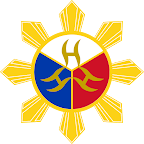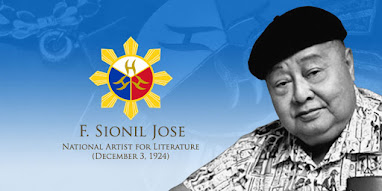The National Artists of the Philippines for Literature
- "The national artist award is a great honor given to a Filipino whose life and works have contributed to the advancement of country’s arts and letters"
September 6, 1916 – August 1, 2002
Year of Conferment: 1990
He was a writer, poet, essayist, critic, journalist, and teacher, is one of the most important progenitors of the modern Filipino short story in English. He pioneered the development of the short story as a lyrical prose-poetic form. His works are now an indispensable part of a tertiary-level-syllabi all over the country. Arcellana’s published books are Selected Stories (1962), Poetry and Politics: The State of Original Writing in English in the Philippines Today (1977), The Francisco Arcellana Sampler(1990).
April 22, 1919 – August 21, 2011
Year of Conferment: 1999
Edith L. Tiempo is one of the finest Filipino writers in English. Her works are characterized by a remarkable fusion of style and substance, of craftsmanship and insight. She was a poet, fictionist, teacher and literary critic. Her poems are intricate verbal transfigurations of significant experiences as revealed, in two of her much anthologized pieces, “The Little Marmoset” and “Bonsai”. She is an influential tradition in Philippine literature in English. Together with her late husband, Edilberto K. Tiempo, she founded and directed the Silliman National Writers Workshop in Dumaguete City, which has produced some of the country’s best writers.
Tiempo’s published works include the novel A Blade of Fern (1978), The Native Coast (1979), and The Alien Corn (1992); the poetry collections, The Tracks of Babylon and Other Poems (1966), and The Charmer’s Box and Other Poems(1993); and the short story collection Abide, Joshua, and Other Stories (1964).
Bienvenido Lumbera
Bienvenido Lumbera
April 11, 1932 - PRESENT
Year of Conferment: 2006
As a poet, he introduced to Tagalog literature what is now known as Bagay poetry, a landmark aesthetic tendency that has helped to change the vernacular poetic tradition. He is the author of the following works: Likhang Dila, Likhang Diwa (poems in Filipino and English), 1993; Balaybay, Mga Tulang Lunot at Manibalang, 2002; Sa Sariling Bayan, Apat na Dulang May Musika, 2004; “Agunyas sa Hacienda Luisita,” Pakikiramay, 2004.
He pioneered the creative fusion of fine arts and popular imagination. As a scholar, his major books include the following: Tagalog Poetry, 1570-1898: Tradition and Influences in its Development; Philippine Literature: A History and Anthology, Revaluation: Essays on Philippine Literature, Writing the Nation/Pag-akda ng Bansa.
N.V.M. Gonzalez
September 8, 1915 – November 28, 1999
Year of Conferment: 1997
Nestor Vicente Madali Gonzalez, better known as N.V.M. Gonzalez, fictionist, essayist, poet, and teacher, articulated the Filipino spirit in rural, urban landscapes. Among the many recognitions, he won the First Commonwealth Literary Contest in 1940, received the Republic Cultural Heritage Award in 1960 and the Gawad CCP Para sa Sining in 1990.
The awards attest to his triumph in appropriating the English language to express, reflect and shape Philippine culture and Philippine sensibility. He became U.P.’s International-Writer-In-Residence and a member of the Board of Advisers of the U.P. Creative Writing Center. In 1987, U.P. conferred on him the Doctor of Humane Letters, honoris causa, its highest academic recognition. Major works of N.V.M Gonzalez include the following: The Winds of April, Seven Hills Away, Children of the Ash-Covered Loam and Other Stories, The Bamboo Dancers, Look Stranger, on this Island Now, Mindoro and Beyond: Twenty -One Stories, The Bread of Salt and Other Stories, Work on the Mountain, The Novel of Justice: Selected Essays 1968-1994, A Grammar of Dreams and Other Stories.
Virgilio S. Almario
March 9, 1994 - PRESENT
Year of Conferment: 2003
Virgilio S. Almario, also known as Rio Alma, is a poet, literary historian and critic, who has revived and reinvented traditional Filipino poetic forms, even as he championed modernist poetics. In 34 years, he has published 12 books of poetry, which include the seminal Makinasyon and Peregrinasyon, and the landmark trilogy Doktrinang Anakpawis, Mga Retrato at Rekwerdo and Muli, Sa Kandungan ng Lupa. In these works, his poetic voice soared from the lyrical to the satirical to the epic, from the dramatic to the incantatory, in his often severe examination of the self, and the society.
He has also redefined how the Filipino poetry is viewed and paved the way for the discussion of the same in his 10 books of criticisms and anthologies, among which are Ang Makata sa Panahon ng Makina, Balagtasismo versus Modernismo, Walong Dekada ng Makabagong Tula Pilipino, Mutyang Dilim and Barlaan at Josaphat. But more than anything else, what Almario accomplished was that he put a face to the Filipino writer in the country, one strong face determinedly wielding a pen into untruths, hypocrisy, injustice, among others.
Cirilo F. Bautista
July 9, 1941 – May 6, 2018
Year of Conferment: 2018
Cirilo F. Bautista is a poet, fictionist and essayist with exceptional achievements and significant contributions to the development of the country’s literary arts. He is acknowledged by peers and critics, and the nation at large as the foremost writer of his generation.
Bautista contributed to the development of Philippine literature: as a writer, through his significant body of works; as a teacher, through his discovery and encouragement of young writers in workshops and lectures; and as a critic, through his essays that provided insights into the craft of writing and correctives to misconceptions about art.His major works: Summer Suns (1963), Words and Battlefields (1998), The Trilogy of Saint Lazarus (2001), Galaw ng Asoge (2003).
May 4, 1917 – April 29, 2004
Year of Conferment: 1976
He is regarded by many as the most distinguished Filipino writer in English writing so variedly and so well about so many aspects of the Filipino. Nick Joaquin has also enriched the English language with critics coining “Joaquinesque” to describe his baroque Spanish-flavored English or his reinventions of English based on Filipinisms.
Aside from his handling of language, Bienvenido Lumbera writes that Nick Joaquin’s significance in Philippine literature involves his exploration of the Philippine colonial past under Spain and his probing into the psychology of social changes as seen by the young, as exemplified in stories such as Doña Jeronima, Candido’s Apocalypse and The Order of Melchizedek. Nick Joaquin has written plays, novels, poems, short stories and essays including reportage and journalism. As a journalist, Nick Joaquin uses the nom de plume Quijano de Manila but whether he is writing literature or journalism, fellow National Artist Francisco Arcellana opines that “it is always of the highest skill and quality”.
September 13, 1903 – May 24, 1970
He was a poet, playwright, and novelist, is among the Filipino writers who practiced “committed art.” In his view, the function of the writer is to act as the conscience of society and to affirm the greatness of the human spirit in the face of inequity and oppression. Hernandez’s contribution to the development of Tagalog prose is considerable — he stripped Tagalog of its ornate character and wrote in prose closer to the colloquial than the “official” style permitted. His novel Mga Ibong Mandaragit, first written by Hernandez while in prison, is the first Filipino socio-political novel that exposes the ills of the society as evident in the agrarian problems of the 50s.
Lazara Francisco
February 22, 1898 – June 17, 1980
Year of Conferment: 2009
Prize-winning writer Lazaro A. Francisco developed the social realist tradition in Philippine fiction. His eleven novels, now acknowledged classics of Philippine literature, embodies the author’s commitment to nationalism. Amadis Ma. Guerrero wrote, “Francisco championed the cause of the common man, specifically the oppressed peasants. His novels exposed the evils of the tenancy system, the exploitation of farmers by unscrupulous landlords, and foreign domination.” Teodoro Valencia also observed, “His pen dignifies the Filipino and accents all the positives about the Filipino way of life. His writings have contributed much to the formation of a Filipino nationalism.” Literary historian and critic Bienvenido Lumbera also wrote, “When the history of the Filipino novel is written, Francisco is likely to occupy an eminent place in it. Already in Tagalog literature, he ranks among the finest novelists since the beginning of the 20th century. In addition to a deft hand at characterization, Francisco has a supple prose style responsive to the subtlest nuances of ideas and the sternest stuff of passions.”
His reputation as the “Master of the Tagalog Novel” is backed up by numerous awards he received for his meritorious novels in particular, and for his contribution to Philippine literature and culture in general. His masterpiece novels—Ama, Bayang Nagpatiwakal, Maganda Pa Ang Daigdig and Daluyong—affirm his eminent place in Philippine literature. In 1997, he was honored by the University of the Philippines with a special convocation, where he was cited as the “foremost Filipino novelist of his generation” and “champion of the Filipino writer’s struggle for national identity.”
Reference:
Order of National Artists: Lazaro Francisco. (n.d.). Retrieved September 30, 2020, from https://ncca.gov.ph/about-culture-and-arts/culture-profile/national-artists-of-the-philippines/lazaro-francisco/











Comments
Post a Comment